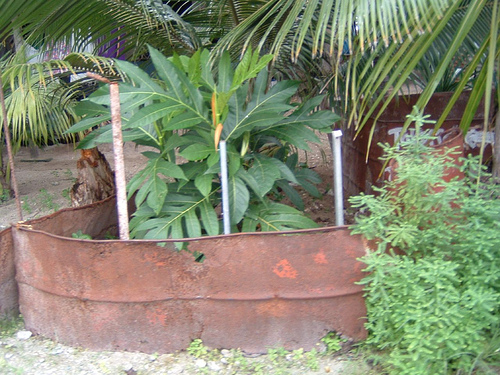Ok, so who knew that John Cage was also “an avid mycologist, collector and consumer of mushrooms“?
Nibbles: CGIAR “change”, Cuba, Data, Pavlovsk, Homegardens, Soil bacteria, Thai rice
- GFAR publishes list of Megaprogramme (or whatever they are called) consultations.
- Cuba’s Miscellaneous Crops Under-delegate Rolando Macias Cardenas reports on tomato paste. In other news, Cuba has a Miscellaneous Crops Under-delegate. No, wait, that’s not really news.
- While Sachs et al. moan about better agricultural data, CIAT go out and get it.
- The Pavlovsk TweetMedvedev campaign rolls on.
- “…maximum diversity can be conserved at an intermediate level of income” in Javanese bamboo-tree homegardens.
- Right, so trees “farm” bacteria. What some people will write in a press release.
- Thailand’s rice farmers trying to cope with climate change. Like they have a choice.
Nibbles: Vancouver Island, Organic breeding, Evolution, Roots, Coffee, ABS, Donkey domestication, Domestication, Yam
- Nancy Turner, great food anthropologist, deconstructs dinner on air.
- Breeding for resilience: a strategy for organic and low-input farming systems? Eucarpia conference in Paris in December. Love the ?
- Ford Denison on evolution in reverse: crops that become weeds.
- Nature on evolution in forward: crop breeders look at roots.
- “Shade-coffee farms support native bees that maintain genetic diversity in tropical forests.” Good to know.
- Want to know about Access & Benefit Sharing negotiations? We thought so.
- Ancient people moved their asses.
- Selection during domestication differs from selection during diversification. For the ass too?
- Expect to see Dioscorea hispida appear in spam emails very soon.
- And today’s answer to malnutrition is a blue-grin alga from Lake Chad. Kidding apart, it’s an interesting story.
Nibbles: Malnutrition, Ethanol, Kenyan tea, Ethiopian coffee, Botanic garden trends, Emmer, Vietnam fish, Guerrilla gardening, Garlic speculation, Brazil and Africa, Cactus, African veggies, Ducks and rice, Salmon
- Nepal’s malnutrition rate apparently the highest in world. But the Micronutrient Initiative is on it. But what about homegardens, I hear you ask. And rice biofortification?
- The advice I’ve been waiting for all my life: better nutrition through alcohol.
- The plight of Kenyan tea workers.
- Harlem church helps Ethiopian coffee farmers.
- Botanic gardens drop flowers, do food. About time too. And botanical art too.
- Jeremy’s farro photos.
- “Iconic” catfish in trouble due to Mekong dam. Everything is an icon these days. Something to do with post-modernism, I guess.
- Seedbomb something today. You’ll feel better.
- WTF is it with garlic in China?
- EMBRAPA reaches out to Africa.
- KARI scientists push Opuntia for livestock. Ok, but surely there are enough native desert plants in Kenya to be going on with? Well, maybe not.
- Zimbabwe market turns to sun-dried vegetables. Wish I knew what umfushwa was, though.
- The Rice-Ducks Integrated Farming System sounds like great fun.
- Why the salmon thrives in Oregon: “Tribal people have practiced a natural, sustained-yield conservation since time immemorial and are taught to plan seven generations ahead.”
Ripe breadfruit blown from a tree in a storm
The final paragraph of The Economist’s obituary of Mau Piailug, Pacific navigator and culture hero:
In 2007 the people of Hawaii gave him a present of a double-hulled canoe, the Alingano Maisu. Maisu means “ripe breadfruit blown from a tree in a storm”, which anyone may eat. The breadfruit was Mau’s favourite tree anyway: tall and light, with a twisty grain excellent for boat-building, sticky latex for caulking, and big starchy fruit which, fermented, made the ideal food for an ocean voyage. But maisu also referred to easy, communal sharing of something good: like the knowledge of how to sail for weeks out on the Pacific, without maps, going by the stars.
And like plant genetic resources, including breadfruit, perhaps. Anyway, a good word to know, maisu. Pacific people really take care of their breadfruit trees, incidentally. I took this photo in Kiribati a few years back.
